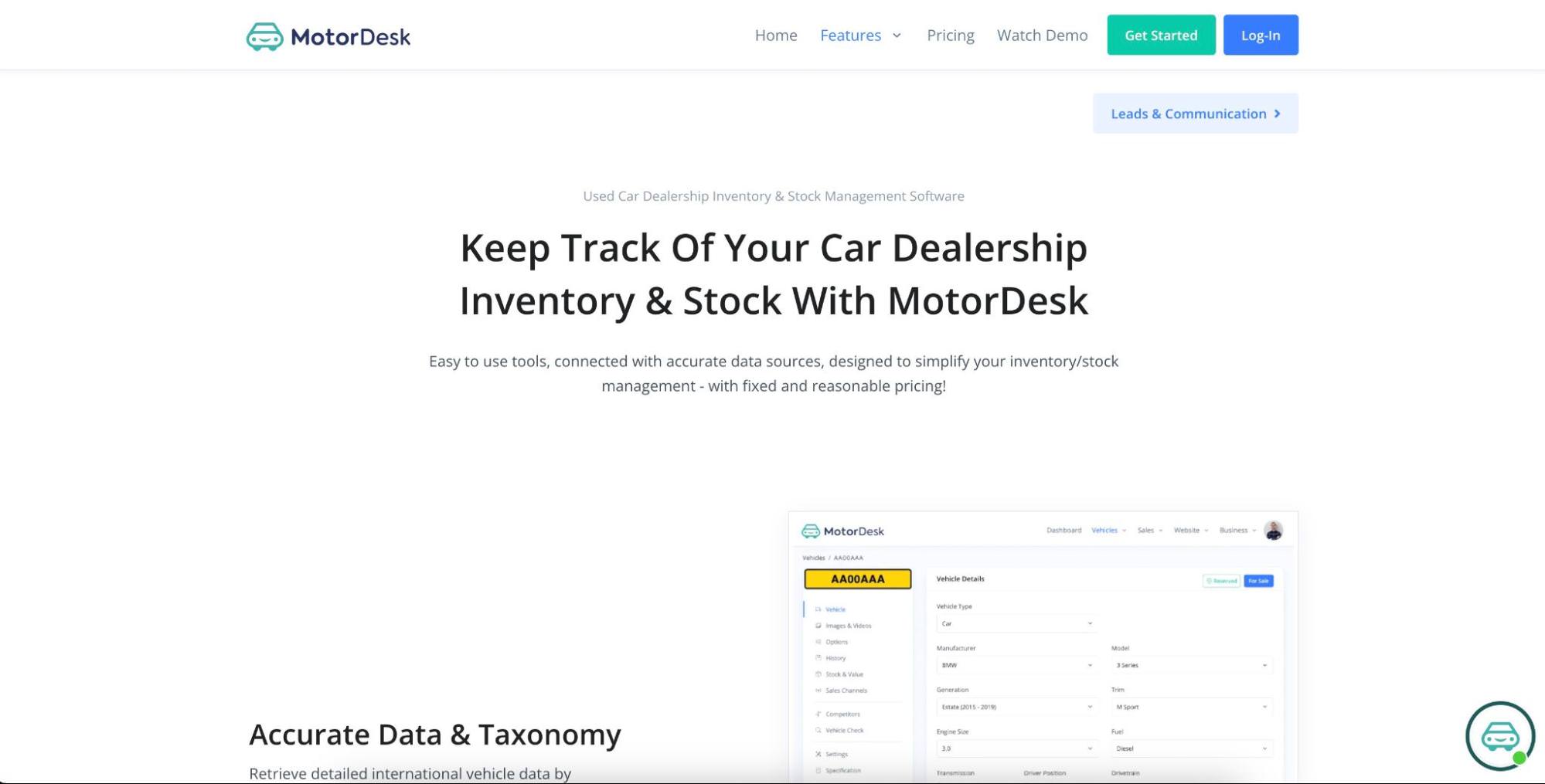- Blog
- Inventory Management in Your Car Dealership - Do You Know How to Do It Right?
Inventory Management in Your Car Dealership - Do You Know How to Do It Right?
Discover effective inventory management strategies for car dealerships to optimize stock, enhance sales, and outperform competitors.

Managing the cars in your dealership might sound straightforward, but there's a lot more to it than just knowing what’s parked on your lot.
Effective inventory management is a key part of running a successful car dealership. Whether you’re dealing with new or used cars, getting your inventory right can mean the difference between profit and loss.
Let's see why this is so important and how you can do it the right way.
Let's start with the basics - Why is inventory management essential for a dealership?
First, inventory management is all about having the right cars at the right time. It helps you meet your customers' needs without ending up with a lot full of cars collecting dust.
Key data and metrics you NEED to know
Imagine flying a plane without knowing any of the instruments. That’s what running a dealership without understanding key data and metrics is like. Here’s what you need to track:
- Average days in stock: This tells you how long it takes for a car to be sold. A lower number means you’re efficiently turning over your inventory.
- Gross profit per vehicle: This is what you earn on each car after costs. It's crucial to know which types of cars are bringing in the most profit.
- Inventory turnover ratio: This shows how many times you sell and replace inventory over a certain period. Higher turnover means your inventory is in good demand.
- Cost of holding inventory: The longer a car remains on your parking lot, the more it costs you. This metric helps you understand the financial impact of unsold cars.
With these metrics, you’re better prepared to make decisions that align with your dealership’s goals and market demand.
Differences in inventory management for small and big dealerships
For small dealerships, every car on the lot is a bigger percentage of your investment. It means you need to be more selective and strategic about what you stock.
Small dealerships benefit from focusing on cars that sell quickly or have a high demand in their specific market.
Big dealerships, on the other hand, have the luxury of variety but face other challenges. They can diversify their inventory to attract a wider range of customers but must be careful to avoid overstocking or neglecting niche markets that could be profitable.
Issues you can avoid with proper inventory management
Here are some common issues you can avoid with proper inventory management:
- Overstocking: Holding too many cars that don’t sell drains your resources and takes up valuable space. Overstocking leaves less space for other investments and operational expenses.
- Understocking: Not having enough of the cars that sell means missed sales opportunities and disappointed customers.
- Obsolete inventory: Cars that are no longer in demand can become costly reminders of the importance of knowing market changes.
Use inventory management software
Dedicated automotive inventory management software can be a game-changer for your dealership. These systems help you:
- Track inventory in real-time: Know exactly what’s on your lot and what’s selling at any moment.
- Analyze data and trends: Make informed decisions based on historical sales data, market trends, and more.
- Optimize pricing: Use dynamic pricing models to adjust prices based on market demand and inventory status.
- Improve customer experience: Match customers with the perfect car more efficiently.
 MotorDesk is just one of many automotive CRMs
MotorDesk is just one of many automotive CRMs
Effective inventory management in action - Strategies for your business
 Be aware of market dynamics
Be aware of market dynamics
The car market is dynamic and fast-changing. What's popular today might not be tomorrow, and vice versa.
Knowing market dynamics and predictions for the used and new car market is crucial. This means keeping an eye on fuel price trends, emerging car technologies, and shifting consumer preferences.
For example, a surge in fuel prices might increase the demand for fuel-efficient vehicles. Similarly, consumers' growing environmental consciousness could spike interest in electric vehicles.
Subscribe to industry newsletters, attend trade shows, and use market analysis tools. This knowledge will allow you to adjust your inventory to meet current demands and ensure your lot always has what your customers are looking for.

 Network and improve relationships with your suppliers
Network and improve relationships with your suppliers
Your suppliers are the single most important part of your business.
Consider expanding your network. In addition to traditional suppliers, explore partnerships with leasing companies, rental services, and auction houses.
These relationships can give you a competitive edge or more favorable terms. Regular communication and being a reliable partner can open up opportunities for exclusive deals or priority access to new releases.
We know that building and maintaining relationships can be overwhelming, especially with so many other crucial tasks that you, as a business owner, need to take care of.
That’s why we’re already networking and expanding our supplier network so that you can benefit from it!
 Price your vehicles accurately
Price your vehicles accurately
Setting the right price for your vehicles is a science. It requires a delicate balance: Too high a price will turn customers away, and too low a price will leave money on the table.
Accurate pricing is critical for driving sales and maintaining a healthy turnover.
Utilize competitive pricing analysis to understand where your vehicles stand in the market.
Tools and software can provide insights into what similar cars are selling for, helping you set competitive prices that attract buyers while still ensuring a good margin.
 Diversify your stock
Diversify your stock
Diversification is key in any investment, and your inventory is no exception. Relying too heavily on one type of vehicle means you run the risk of that vehicle not being in demand anymore.
Diversify your inventory to include a range of vehicle types, makes, and models.
This strategy not only protects you against market fluctuations but also broadens your customer base.
Different customers have different needs, and a diversified inventory means you’re more likely to have something for everyone.

 Be creative with car sourcing
Be creative with car sourcing
Finding cars to stock your lot can be challenging, especially in a competitive market. It's time to get creative with your sourcing strategies. Explore online platforms, like eCarsTrade, private sales, and even social media for potential leads.
International sourcing can also offer unique opportunities, especially for hard-to-find models or better pricing.
By broadening your sourcing channels, you can diversify your inventory and potentially reduce acquisition costs, increasing your margins on each sale.
 Find ways to optimize your inventory turnover ratio
Find ways to optimize your inventory turnover ratio
A healthy inventory turnover ratio is a sign of a well-managed dealership.
It indicates that you're not just selling cars, but you're selling them at the right pace - not too slow, not too fast.
To optimize this ratio, monitor your sales trends closely and adjust your buying accordingly. If certain models are flying off the lot, stock up on those. If others are not selling at all, it might be time to accept your losses and move on.
Promotions and marketing can also help move slower-selling inventory, but you need to balance this with acquiring new stock that reflects current demand trends.

Cost-effectiveness - 4 Strategies for a medium-sized dealership
Being cost-effective means allocating resources to strategies that give the highest returns. Let’s look at some practical approaches.
1) Improve your online presence
In today's digital age, a strong online presence and knowing how to utilize marketing for your car dealership it's a critical business necessity.
For a medium-sized dealership, enhancing your online visibility through a well-designed website, active social media channels, and strategic online advertising can attract more customers at a relatively low cost.
Showcasing your inventory online with detailed information and high-quality photos can also streamline the sales process. Potential buyers can make informed decisions before they even step onto your lot.
2) Focus on fast-selling models through data analysis
Identifying and stocking fast-selling models is a strategy as old as the car dealership business itself, but it’s so important.
Analyzing sales data to understand which models sell quickly and yield good profit margins allows you to optimize your inventory to meet demand.
Monitor sales data, market trends, and customer preferences closely to ensure you're stocking the right vehicles at the right time.
Implementing a data-driven approach allows you to:
- Adjust inventory levels based on seasonal demand changes.
- Identify which vehicle features or models are most popular with your customer base.
- Reduce the risk of overstocking.
Inventory management software can provide you with this kind of data analysis, along with actionable insights and predictive analytics to help you with inventory decisions.

3) Building strong supplier relationships
A strategy often underestimated when it comes to inventory optimization is building and maintaining strong relationships with suppliers.
Good relationships can lead to numerous benefits, such as:
- Access to better pricing or exclusive models, giving you a competitive edge.
- Improved supply chain reliability, ensuring you get the vehicles your customers want when they want them.
- The opportunity for collaborative promotions or marketing efforts, which can drive sales for both parties.
Regular communication, prompt payments, and a willingness to work through challenges together are key to fostering these valuable relationships.
4) Embracing technology for inventory management
Automotive inventory management systems offer a multitude of advantages:
- Real-time inventory tracking helps avoid stock discrepancies and ensures accurate sales data.
- Automated alerts for low stock or high-demand models prompt timely restocking.
- Integration with marketing tools allows for dynamic advertising, targeting potential buyers with vehicles that match their search criteria.
By embracing technology, dealerships can not only improve their inventory management but also enhance the overall customer experience.
 Register on eCarsTrade and outsell your competitors
Register on eCarsTrade and outsell your competitors
In today’s fiercely competitive car dealership industry, having a unique advantage can significantly influence your market position.
eCarsTrade presents such an opportunity, offering a comprehensive platform that can propel your dealership ahead of the competition.
eCarsTrade grants you access to a vast array of vehicles, from everyday models and small city cars to popular hybrids and luxury SUVs.
This variety allows you to cater to a broader customer base and meet specific demands, whether for fuel efficiency, luxury, or unique features.
With eCarsTrade online auctions, sourcing vehicles becomes more straightforward and efficient.
You can find detailed information and appraisal reports for most of our vehicles, allowing you to make informed decisions from the comfort of your office.
With eCarsTrade, you can tap into markets that may offer better prices or unique vehicles, giving your dealership a competitive advantage.
Frequently Asked Questions
Let’s address some common questions that dealerships might have about inventory management.
► My dealership is small. How can I manage inventory effectively with limited resources?
Using technology and data is crucial for small car dealerships. A car inventory system provides key information and makes managing stock easier, so you can make smart choices. Also, having the right fast-selling cars and good relationships with a few trusted suppliers can make your stock just right without requiring a lot of resources.
► What are the most critical metrics to track for inventory health?
You can check how well your car dealership's stock is doing by looking at a few important numbers:
- Average days in stock: Tells you how fast cars are selling, so you can plan buying and selling better.
- Gross profit per vehicle: Shows how much money you make on each car, helping with setting prices and buying cars.
- Inventory turnover ratio: Shows how often you sell and replace cars, pointing out how well you meet customer needs.
- Cost of holding inventory: Shows how much it costs to have unsold cars, highlighting why it's important to sell cars quickly.
► How can I stay informed on changing market trends and customer preferences?
To stay informed, you need to actively seek out market trends and listen to customers. Use reports, sales figures, and surveys to spot trends. Talking to your community and being active online can also give you up-to-date information on what customers want.

► How do I find the best balance between stocking popular vehicles and unique niche models?
To balance your stock well, know your market and what your customers want. Look at sales to see what's trending. Having popular cars means reliable sales, and special models draw in certain buyers and get people talking. Check your stock regularly to make sure it matches what people want and meets your dealership's aims.
► How can eCarsTrade help me improve my inventory turnover?
eCarsTrade can enhance inventory turnover by offering access to a wider range of vehicles, enabling you to adapt to market demands and customer preferences quickly. With detailed info and history on each car, you can make smarter buying choices. This means cars don't sit unsold for long, and you can sell more cars in less time.
► I'm concerned about the quality of vehicles sourced internationally. How does eCarsTrade address this?
eCarsTrade provides comprehensive vehicle histories and condition reports, ensuring transparency. Additionally, the platform features vehicles from reputable sources, such as known leasing companies that sell well-maintained end-of-lease vehicles.
Elevate your dealership with smart inventory management
Handling inventory management might look tough, but the right methods and tools can help your dealership stand out.
Use technology, keep up with market trends, and build good relationships with both suppliers and customers.
It's not just about selling cars; it's also about creating trust. By using the tips we talked about, you're doing more than just keeping track of cars - you're making sure your dealership is more successful and lasts longer.
Boost your dealership with clever inventory management and get ahead of the competition.



